
Nick (centre-left) and DeVotchKa: “I always dreamed of writing scores and used that as an influence.” Pic: Jen Rosenstein
The Colorado-based quartet’s frontman talks about making their cinematic indie music and scoring award-winning movies ‘Little Miss Sunshine’ and ‘Paddington’
Originally a backing band for burlesque shows, the genre-defying ensemble from Denver, DeVotchKa, broke out in 2006 when they scored much of the Academy Award-winning movie, Little Miss Sunshine. The opportunity led to a run of critically acclaimed albums and sold out shows across the US and Europe, including performing to 80,000 people at the Stade de France in support of Muse.
The band’s multi-instrumentalist frontman and founder Nick Urata has also gone on to score more than 25 films including Paddington, Crazy Stupid Love, Whiskey Tango Foxtrot, Ruby Sparks, and Focus. Nick recently collaborated with Neil Patrick Harris to create the theme song for Lemony Snicket’s A Series of Unfortunate Events, as well as several other original songs performed by the cast.
As DeVotchKa announced the UK release of their latest album, we took the opportunity to chat with Nick about making music with the band alongside working on soundtracks. But it turned out he was visiting our country for a different reason…
What brings you to London?
“It’s been a long time in the making, I was very blessed to land the gig of scoring the movie Paddington, which is near and dear to many. The producers always wanted to perform the score live, so we’ve been working on it for a couple of years now, and we’re going to debut it on Sunday at the Theatre Royal.”
Is this a one-off event or a series of performances?
“This is the premiere and we’re going to take it cities around Europe and Asia. If it goes well!”
I’m sure it will. We’d like to talk more about your recent film work, but first take us back to your earliest memories of writing and composing music.
“I’ve always been attracted to music and fascinated with it. I was lucky enough to come from a musical family and I started banging on the piano as early as I could – I was four or five years old. I started studying music in school and I was always trying to come up with my own sound, and come up with stories. Part of it was because I wasn’t very good at playing other people’s music! Then I got into rock bands when I came to high school age and always served as the arranger in all the bands I’ve been in. Like many songwriters probably say, the first 100 or so songs are pretty awful!”
Do you remember being influenced by movie soundtracks at that point?
“Yeah, I think that was my early attraction to music. I always loved soundtrack music. In fact, I used to buy soundtrack albums when I was a kid. Laurance Of Arabia was probably my first one, I loved that. I also used to sit in front of the TV with my cassette recorder and record my favourite movies for the score. I remember The Guns Of Navarone was an awesome one that I loved. So I always dreamed of writing scores and used that as an influence for our sound when I got to be in DeVotchKa. The rest of the guys in the band are also huge soundtrack fans, and we always aimed to let that guide our recording and writing styles. I don’t know if it came through, but some people have described us as ‘cinematic’ so maybe we got some of the ideas across. We must’ve done something right because our third self-released album [How It Ends] was when we attracted the directors of Little Miss Sunshine.”
Were you trying to get the attention of the film industry at all with your earlier releases?
“Oh no, we really just wanted to apply our love for soundtracks. As I said, I always dreamed of writing scores and directing films, so I figured we could make little films without a camera.”

Nick (far right) and the band: “We’ve dragged in many talented people to help us!” Pic: Jen Rosenstein
So how did it happen with Little Miss Sunshine?
“That was really lucky. Early on we found a friend at a non-commercial public radio station called KCRW, based in Los Angeles, and they’re a great supporter of all music. They started playing our record and the directors happened to hear it one Saturday morning, and something sparked in their mind about the sound of the film. So we became friends and started collaborating.
What was it that they heard first?
“They told me it was You Love Me, and I guess they must’ve spied on us at a few gigs without introducing themselves, which is pretty funny! I’m glad because we would’ve blown it if we knew there were Hollywood directors in the crowd!”
So that became your first shot at writing a movie soundtrack. How did you approach it, collaborating with composer Mychael Danna?
“Luckily, of course, Mychael is hugely experienced and generous, and guided us through the hard learning curve from being in a band and having nothing but time on your hands, to all of a sudden having very hard deadlines and strict confines, sometimes. So he was very helpful in guiding us through the process.”
What did you learn from that process? Is there anything you know now that you wish you’d known then?
“I’d say, don’t wait around for someone to come knocking. I guess that was the best thing we did, despite playing my first few recordings to some friends – who were actually in the music industry – and them saying, ‘Don’t quit the day job!’ That being said, go out and make your own records. I think, since we started it’s become easier to make your own record, and one of our blessings was the internet, sharing and social media. For all indie bands, that’s opened it up – you don’t need the traditional record labels. So just get your stuff out there and if you have friends making short films or student documentaries, score whatever you can and say ‘yes’ to every opportunity.”
When you’re scoring for different films, is the process very similar, or does each movie involve a different approach?
“The basic framework is pretty much the same. The funny thing is, the score is always the last thing to be done, so it’s usually given the least time and resources. So you have that extra pressure. But basically you get a rough cut that they’re still editing, they show you where they want music and what kind of music they’re thinking of, then it’s up to you, you’re off to the races. It’s a very collaborative process: at that point, the director and everybody are so immersed in the film, you can’t just come in and bang out some stuff on the piano without paying close attention to the story, the performances, the dialogue, and the tone of the film.”
How about when you’re writing music to record and release as a band? Is that a collaborative process as well, or do you tend to get together when you’ve got a finished song?
“It varies. There are some songs that you get attached to and they’re completely finished, and then there are some that are completely collaborative. I have great collaborators, so it’s been a healthy relationship that way.”
Has that relationship evolved over the 18 or so years you’ve been together?
“Yeah, I think in the beginning I was leaned on a little bit more, but then as the others felt more confident in their contributing roles it became more productive.”
Is DeVotchKa still mainly you, Tom, Jeanie and Shawn?
“That’s the core, but we’ve certainly opened up to a universe of friends and collaborators along the way. We’ve dragged in many talented people to help us!”

Nick (far left) and DeVotchKa: “Go out and get yourself djembe or anything that’s new to you.” Pic: Manmade Media
Tell us about the latest album, how that came together. How do you find it jumping into different projects?
“I guess this album is a great culmination of my foray into scoring films, the reality of that, and the reality of keeping a band together. It definitely clashed in the last couple of years when I was trying to finish these songs, so it sort of became an amalgamation of the two, where I realised if I was ever going to finish this, I would have to somehow join the forces. So at the same time I was arranging for films, I’d slip in arrangements for DeVotchKa, and kept developing that. It took a little longer than usual, but I think the results are pretty unique.”
Your style is still pretty distinctive and cinematic – the album could very easily be a soundtrack – but it manages to stand alone as a piece of music. Is that a tricky balance to strike?
“Well, yeah, I’m glad it came across that way. You never know from our perspective how it’s going to be received, but that was the hope: that it wouldn’t be too ‘soundtracky’ or too poppy! I’d always had the best luck when the lyrics drove the song, and where the music went together I wanted to be sure that each one of these was the same. From my experience, with the band, that’s been the best way to let the lyrics pave the way for the music. It just happens better and people seem to connect with it a little bit more – I spent a great deal of time editing and waiting for the right lyrics to come along. For me, it’s a very hard thing to force; lyrics are such a tricky part of this.”
Does that mean there’s a clearer narrative running through those songs?
“Yeah, yeah, I mean that’s the goal: to have a clear narrative and story. I ran into this problem where some of the songs were languishing because I couldn’t finish a certain line, or find the right word, which is probably my biggest flaw. So that’s something I haven’t learned yet, but I do find if you show up every day and try, whatever that benevolent force is that feeds you good stuff will throw you a few crumbs every now and then!”
Where do you like to write and compose?
“You always dream of being at a desk or in the studio, or someplace comfortable, but inspiration sometimes strikes at inopportune moments. I used to sometimes call my voicemail and leave songs there, or scribble it on cocktail napkins. I find the best stuff comes to you when you’re ill-prepared – you’ve got to be ready somehow. My biggest fear is you’ll forget something cool that comes to you.”
How about when you’re developing an idea? How do you set up your environment to help you create?
“I do like to sequester myself. That’s what’s so great about touring – as much as you go kicking and screaming once you’re outside your confines and comfort zones, some creative stuff starts to happen. I don’t know why that is, but I find that travelling and walking always seems to enhance that.”
You can play a long list of weird and wonderful instruments – have you ever written a song with anything crazy like a bouzouki or a theremin?
“That’s one of the reasons why I dabble with other instruments. I think that’s another key if we’re talking about inspiration: go out and get yourself djembe or anything that’s new to you. If you’re stuck in a rut, I always find that if you go to junk shop or garage sale and pick something up that you’ve never played before, it helps to get things going.”
And finally, if you could’ve written the score to any movie, or if there was a dream movie that hasn’t been made yet that you could write the soundtrack for, what would it be?
“Oh man! I guess the dream movie, er… I guess the last film that Stanley Kubrick never got to finish, starring Marlon Brando or James Dean, or Gregory Peck. To work with those heroes that are gone, that have shaped all of our landscapes, I think would be a dream for anybody.”
Interview: Aaron Slater
DeVotchKa’s new album This Night Falls Forever is out now. Watch the lyric video for the lead single Straight Shot below. Find out more about Nick and the band at devotchka.net



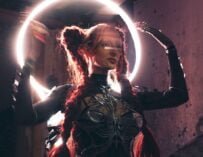
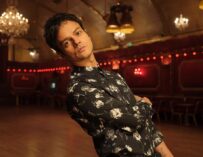
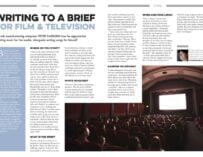
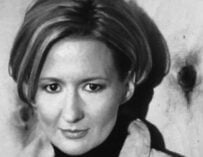
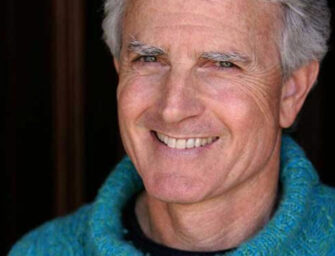

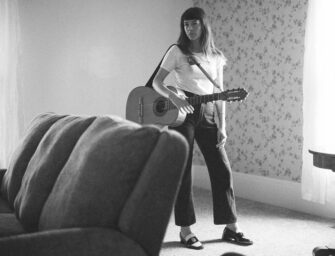
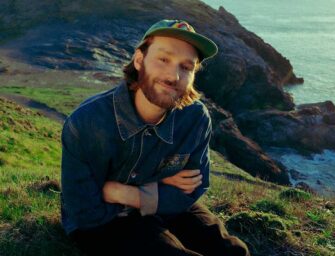
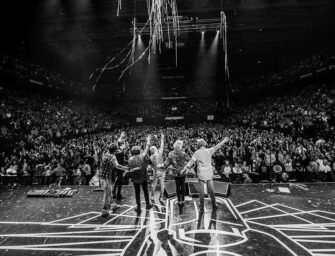























Related Articles